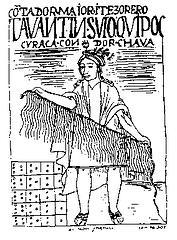Guaman Poma: chronist, informant answerer

If we Speak about Guaman Poma de Ayala, the author of the remarkable book Primer nueva corónica y buen gobierno (First new chronicle and new government) we are talking, inevitably, about the person whom has studied it more diligently and who is considered as one of the most important investigators of his life and its work. We are talking about doctor Rolena Adorno, from the University of Yale. Doctor Adorno visited us in this opportunity to participate in the conference "Jornadas Andinas de Literatura Latinoamericana" (Andean dissertations of Latin American Literature) - JALLA and we had occasion to talk with her minutes before of her dissertation in the main room "Rosa Alarco" (San Marcos University).
Everything began with John Murra
The first question that comes us to the mind is how her interest by this chronist of XVI century was born ? "All begun in the years of study for the doctorate in the University of Cornell in Itaca, New York. I thought to make Gold-Century Hispanic Literature and I was recommended to contact with professor John Murra who was one of the most important specialists of the Andean world. So I did it and I said to him that it wanted to study the work of Inca Garcilaso de la Vega. He gathered me and said "and why not Guaman Poma de Ayala?". I asked to him "who is him?" and he answered 'if you do not know, you must find out'... and then everything began ", that is what doctor Adorno say to us with an wide open smile, and, in addition, she said that it has been more than 30 years dedicated to study the impact that Guaman Poma had in history and literature of Peru.
We investigated precisely inside this topic, about the nature of this extraordinary more- than -thousand- pages book, that seem be more than a simple collection of historical data. "I took very in serious what the same author said about his work to whom he called book and chronicle; he gave a title organizing it by chapters and offering a very interpretative vision to us, all through its 400 drawings"; also she argued that echoes of certain literary sorts between their pages can be found. Nevertheless Adorno emphasized its importance for being a work of symbolic interpretation on the Andean and virreinal world of the time.
Chronicle of 20 years
Felipe Guaman Poma de Ayala dedicated more than 20 years in writing his book. His intention was to tell about the old Andean society and to show the abuses and the danger the native people was, because of the Spanish colonization. The Nueva Coronica y Buen gobierno went out of Peru at the beginning of century XVII, nevertheless, it is not known if king Felipe III, to whom the book was adressed, received it. The certain thing is that, after being in power of different private collections, it settled into the bookcases of the Royal Library of Denmark until 1908, when Richard Pietschmann found it. Throughout the last years, the responsibility of Guaman Poma over the Nueva Cronica, has been in discussion because some specialist doubt about it.
Even some of them said that Blas Valera was the true creator. Doctor Adorno expressed that the scientific world has rejected these proposals and hypothesis by lack of evidences. "Blas Valera is, as Raúl Porras called , a ghost chronist because we do not have its works in its original ones, but that has been known already from aims of century XVI. In addition if those supposed authors confront themselves, it will be seen that the taken positions are opposed completely to those of Guaman Poma or Garcilaso, are not possible to be confronted 6 or 7 pages with the thousands that they wrote."
At the moment, doctor Rolena Adorno prepares another work that, -no doubt about it- will shake the scene in the academic world. One of them is the critical edition of the final manuscript of Fray Martín de Murúa, contemporary cronist to Guaman Poma. That text is in the Goethe museum in California. "2 years ago I discovered, when doing a reading of the work in a microfilm, that this one has many censured passages. I am a lot interested in the problem of the censorship and that is an immediate reason to work in a new edition". The time of the interview is over to us and when realize about it, we noticed that the audience in the main room, is almost full. Nevertheless a last question is possible to make to this intellectual of great international reputation and a simplicity and warm that astonishes to us: her opinion about the Latin American literary critic done by Latin American researchers. "It is the base of everything what we do, there is no doubt about it; they gave us the start point to study the Literature of the colonial times as something important and extremely original and all the researchers around the world have been able to take a lot of benefits from them because they have been watchtowers in our field".







0 Comments:
Post a Comment
<< Home